Fatman is the Christmas movie the world needs, impeccably and fatefully delivered to the world in the year that is 2020. Writer-directors Eshom Nelms and Ian Nelms collaborated on the most impeccable of holiday hits, starring Mel Gibson as a Chris Kringle cinematic history has never seen, and Walton Goggins as the hitman charged with taking him out.
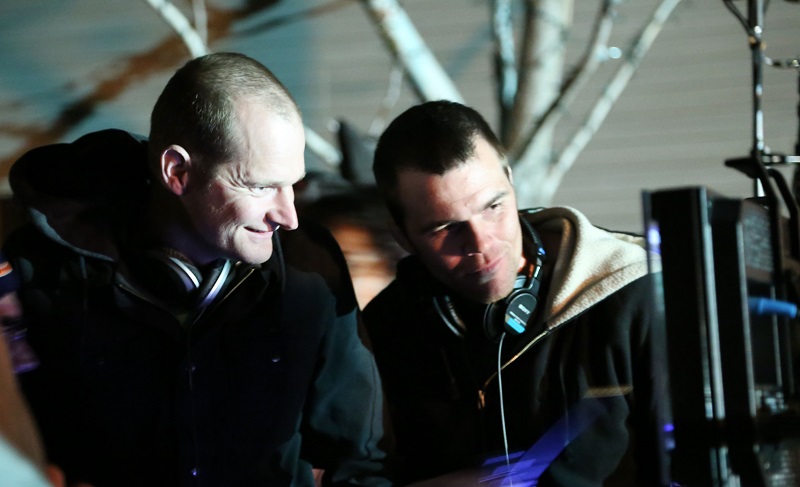
Yes, you read that correctly. As Goggins says (as only he can utter) so eloquently in the film, “I’ve come for your head, Fatmaaaaaaaaan!”
Now, as Gibson says in the film, “You think you’re the first? You think I got this job because I’m fat and jolly?”
No, no he didn’t, and the sibling movie makers phoned The Movie Mensch for an exclusive chat that takes us inside the making of a modern masterpiece that will forever be known as a Christmas classic. I’m from the camp that believes Die Hard is one of those slices of Hollywood holiday heaven, so now I can look forward to the most divine of double features each December.
Eshom and Ian reveal the beyond blissful joy that is getting Gibson to star in their film as the titular character and how it was during the Oscar-winning director’s awards promo tour for Hacksaw Ridge that that aspect became crystal clear. They had their Santa. They also dish the delightful edge that Marianne Jean-Baptiste brought to the role of Mrs. Kringle. She is very much a woman that is married to a Mel Gibson Santa, but still… she bakes cookies that are literally to die for!
The boys also reveal the surprising depth that Goggins brought to his role that can be seen in every single frame of this magnificent flick. Lastly, we wanted to know where on earth this wild idea arose from and how long this stroke of perfection had been percolating? Read on and prepare for a Santa-sized thrill-ride, unlike any holiday film fare you’ve ever seen.
The Movie Mensch: Thank you, for taking the time this morning to chat with me.
Eshom Nelms: Absolute pleasure. I’m so glad that you enjoyed the film, means a mountain to us.
The Movie Mensch: Oh my, such a blast, such a blast! I’ve been telling everybody I know.
Eshom Nelms: You’re good man sir. Thank you.
Ian Nelms: Appreciate you, Joel.
The Movie Mensch: First of all, what was the genesis of this wildly original idea?
Eshom Nelms: This is something that we came up with 14 years ago. Tim Allen did a splendid job in those sort of family-friendly fair [as Santa]. Right? We’ve seen the sociopath that came down your chimney trope job. Ian and I just felt there was a space in the genre, for something grounded, a gritty take on Santa Claus that sort of exposed his idiosyncrasies and the spoilables, and just made him more relatable as a common man. This might give more of our sensibility away as to why we kind of leaned into that, is that when we were kids, we were big, I guess our entire family was really kind of Clint Eastwood…
Ian Nelms: Centric!
Eshom Nelms: Centric! Yeah. Our mom got something called the Clint Eastwood collection. Every two weeks we would get a new VHS tape in the mail, and we would watch the hell out of them. I mean, all the Westerns, all the Dirty Harry’s.
Ian Nelms: Yeah. Even Firefox.
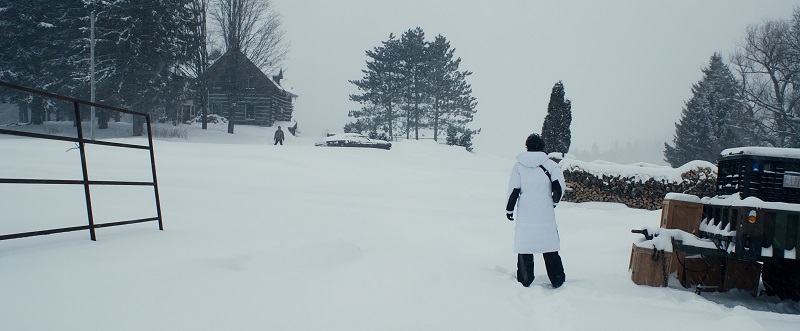
Eshom Nelms: I mean, we would watch the hell out of all of them. I guess, looking back… As you look back, [our Santa], he’s kind of Dirty Harry-ish. He’s kind of Clint Eastwood-ish. It’s kind of a Leone Western standoff at the end. It’s definitely got that flavor to it that we like. Another thing that’s interesting is we were just talking about the very first DVDs that we ever purchased and mine was Unbreakable.
Ian Nelms: And mine was Unforgiven.
Eshom Nelms: Isn’t that interesting?
The Movie Mensch: It was very “Un” of you guys. That’s a trip. I was going to say, it seems like this part just screams Mel Gibson. I know you’re talking about Clint, but I mean… What was it like when you got the yes from his camp?
Eshom Nelms: Look, Ian and I are huge Lethal Weapon fans, huge Mad Max fans. Gibson, he’s way up there. He’s definitely, he’s on par with Eastwood.
Ian Nelms: For sure. So, this was kind of a dream working with the man.
Eshom Nelms: Our mom curated the Eastwood, but yeah, Ian and I are very, very much Mel Gibson fans. So, it was honestly, working with him was a dream come true, man.
Ian Nelms: We saw him at a screening for Hacksaw Ridge and he had that amazing beard, and he was in the middle of an awards campaign. He was kind of kneading his beard and you could feel that awards campaign on his shoulders at that point. It just felt he had the weight of the world on him and we really liked that vibe. From hearing him speak and being very passionate about what he had done, the film. We were just, “Oh man, this is the guy. This is perfect. It’s him.”
Eshom Nelms: When it comes to three years later, we were putting the film together and we’d been trying to get it going for about 14 years. The problem was we didn’t have anything that really said what tone it was going to be. They would read it and say, “It’s very director dependent. This is (expletive) crazy. How are you going to? What is this?” Finally, we did Small Town Crime, and we were able to sort of point back and say, “Hey, this is the tone. It’s got a Western undercurrent. It’s got a little humor, got a little drama, got some action.
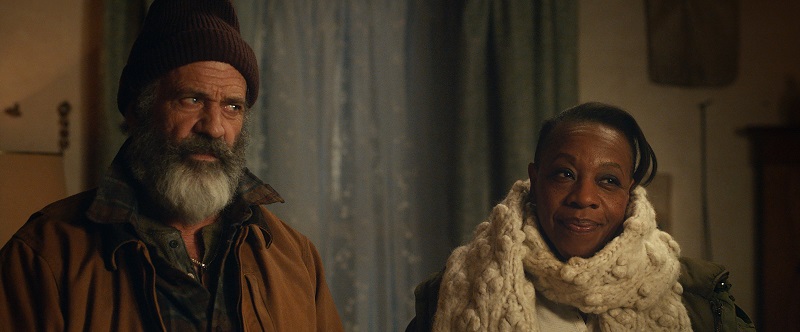
Ian Nelms: But all very grounded.
The Movie Mensch: And I totally kept coming back to a High Noon finish there.
Ian Nelms: Oh, yeah.
The Movie Mensch: And the way Walton Goggins just yells out Fatman.
Eshom Nelms: Walt is such a beast, man.
The Movie Mensch: I love him, man. He can do no wrong. Watching him lose himself in the role of a lifetime. And you guys wrote for him, is just one of the laundry list of awesome things about Fatman. What was your biggest takeaway from the Goggins experience?
Eshom Nelms: He was amazing to work with. I mean, the most fun thing about him is even beyond his performance. It’s just him as a person and his method. And he comes very prepared, he’s layered this guy up. He’s one of those actors that is able to let everything just melt away around him, and just dive right in and it’s just very pointed. On set, he’s got the voice. He’s out having a little break in between takes and you can literally talk to him say, “Hey Walton, what are you getting out for lunch?” Or, “Hey Walton, we do think about this take?” And he’s, “I’ll just have chicken.”
Ian Nelms: Chicken is always kind of simmering.
Eshom Nelms: Exactly.
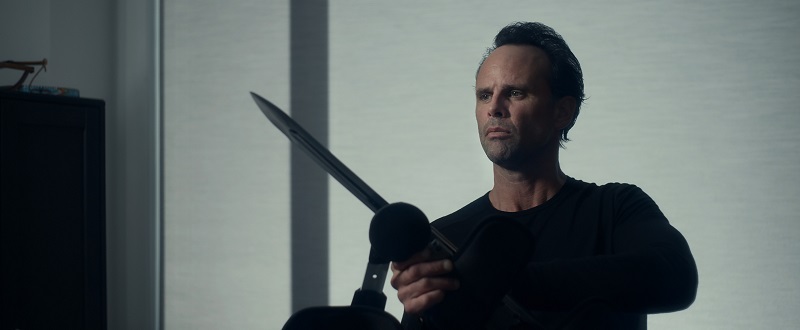
Ian Nelms: I also think that he goes full scene, no matter what. I mean, I remember we were out there in the snow during the final standoff. And it was a part where we could have a stuntman do it and it would have been fine. But Walton was so juiced, he’s, “No, I got to do this. I want to be rolling around with Mel in the snow. This is the price of admission right here. This is what I want.”
Eshom Nelms: “It’s why I’m here, baby.”
Ian Nelms: He jumped out of that snow and it was fun, man. Such a blast.
The Movie Mensch: That is awesome. The thing about Mel is, he’s also an Oscar-winning director. Was that aspect intimidating or illuminating? And did he ever offer his two-cents or kind of, what was that like for you guys?
Ian Nelms: I think it’s both, right? At one point we were like, “Holy smokes. What’s it going to be like directing Mel? I mean, the guy’s won Oscars.” Then when we got on set, all that anxiety quickly faded away because he was such a wonderful collaborator. Approached everything with, hey, here’s an idea. You don’t have to take this. I’m just thinking this. And so truly was there as a unified, force in a creativity to get the picture that we all wanted.
Eshom Nelms: He was very cool because he would come up to us and be, “I’m totally into your vision. So, I’m on board with what you’re doing. So, if you guys don’t want to use this, don’t worry about it.” Which of course makes us more open. Also, he’s such a tremendous talent and resource. Ian and I are picking his brain every second we get, “Hey Mel, what else?” “Braveheart… what were you doing here? Apocalypto…” He’d be, “Oh, on this movie I double printed frames for emphasis.” And we were like, “double printed frames?” We double printed frames in Fatman. We were taking everything we could get. We were trying to get as much info out of that man as possible.
The Movie Mensch: You mentioned Hacksaw Ridge man. That movie just blew me away. And I do remember that beard. That was one righteous beard.
Eshom Nelms: It definitely made an impression.
The Movie Mensch: They say that writing is a solitary process. Yet you guys have each other, what is the best part about having a partner in a creative process?
Eshom Nelms: For me, it’s that I have a sounding board. We like to bounce a lot of ideas off of each other. And if it passes both of our (expletive) tests, then it goes in. If it doesn’t, then we work on it until we figure out what will. I also think it’s fun for Ian and I to bounce ideas back and forth. We kind of each put a little spin on the ball and throw it back.
Ian Nelms: Probably the craziest part of it is that, by the end of the script. Probably 99-percent of it, we can’t remember who wrote what, or who came up with what!
Eshom Nelms: Because most likely, it’s a line somebody came up with and then the other person improved.
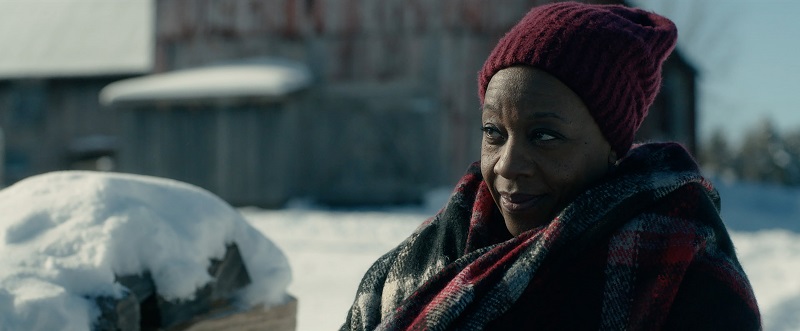
The Movie Mensch: I cannot think of a better Mrs. Claus, and of course this crazy world that you’ve created. She still makes one amazing cookie, and it’s that kind of touches that I thought were just so right. But what were you looking for in a Mrs. Claus and what did Marianne Jean-Baptiste bring to it?
Ian Nelms: We had a lot of fun playing with sort of stereotypes and just opposing your expectations of who someone’s going to be or how they fit together. We wanted to play with that here. And Marianne was absolutely at the top of our list of someone who’s incredibly talented because the one thing we really wanted obviously, was a ground performance. But we wanted someone who was really strong and really warm. From the films that we watched her in, I mean, she just exudes that. She’s an alpha, but she’s also very motherly. She has that.
Eshom Nelms: I think we’d be lying if we didn’t say we’re drawing upon our own parents’ relationship in a lot of ways. They both collaborated in a business together. Our dad was a photographer for 20 years. My mom was the reason the business didn’t go bankrupt several times over though.
Ian Nelms: He went to college for photography. He studied photography. He taught her how to do photography. She was an amazing photographer in her own right. But she very much was, beyond being incredibly talented behind the camera, she was the only reason the backbone of why that place ran. He was the face of the business, but she was the only one keeping it afloat.
The Movie Mensch: There’s something really magical about the movie. Yet you never show Santa in the sleigh. I mean, we see them working on the sleigh after some people taking some shots at Santa, which we laugh about a lot here. But you allude to the magic of what Santa… I mean, was it a conscious decision not to show that part?
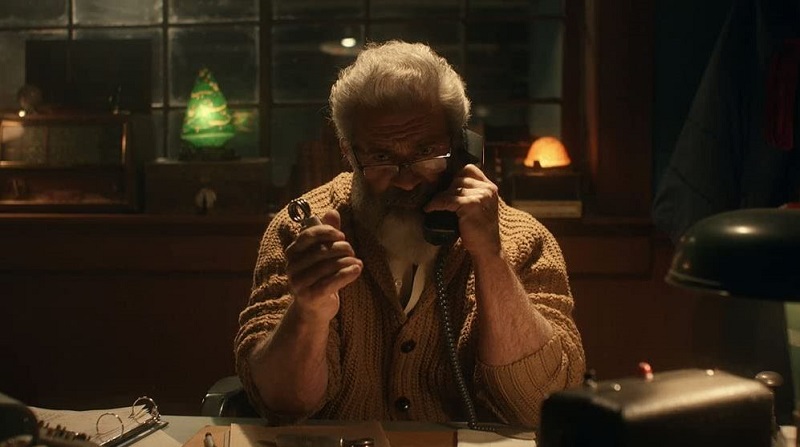
Eshom Nelms: Absolutely. Ian and I felt that those sort of tropes would be run over in previous movies. For us, we were really interested in seeing those between moments.
Ian Nelms: We were thinking, “I’ve seen this so many times, I don’t want to see it again. This isn’t that movie anyway. Let’s focus on the moments that you don’t see in those other movies. That’s what we should be a 100-percent focused on.” The real world of him having to feed the reindeer, as opposed to them just hooked up to a sleigh, flying through the air. Him having to repair the sleigh, just a glimpse of it. And not even in its glory, right? It’s in the garage under a tarp, very utilitarian.
The Movie Mensch: Above everything else, Fatman is just supremely entertaining. What do you hope audiences take away from it? This is a perfect Christmas movie for 2020. If there was ever a Christmas movie for this year, this is it.
Eshom Nelms: I think that’s it, right. We created this to entertain. I think people need to have fun, more fun in 2020. And hopefully, this provides that for them.
Ian Nelms: We definitely are entertainment first, but there’s very much the themes that we were hoping to get out of it. The consumerism, the capitalism-
Eshom Nelms: The redemption.
Ian Nelms: The redemption. Then there’s the sort of back part of it where it’s kind of a call to action. You’ve got a guy, the most benevolent, supposedly the most benevolent person, saintly hood on the planet. And he can’t quite figure out how to inspire people to a level of goodness. And he’s trying to figure it out and by the end of the movie, he realizes that he needs to go out and do it one person at a time, old school. It’s time to take action.
Eshom Nelms: I think Ian sort of nailed it right there. It’s look… he’s having a crisis of confidence in a really difficult time, and in the end, he has to overcome.

